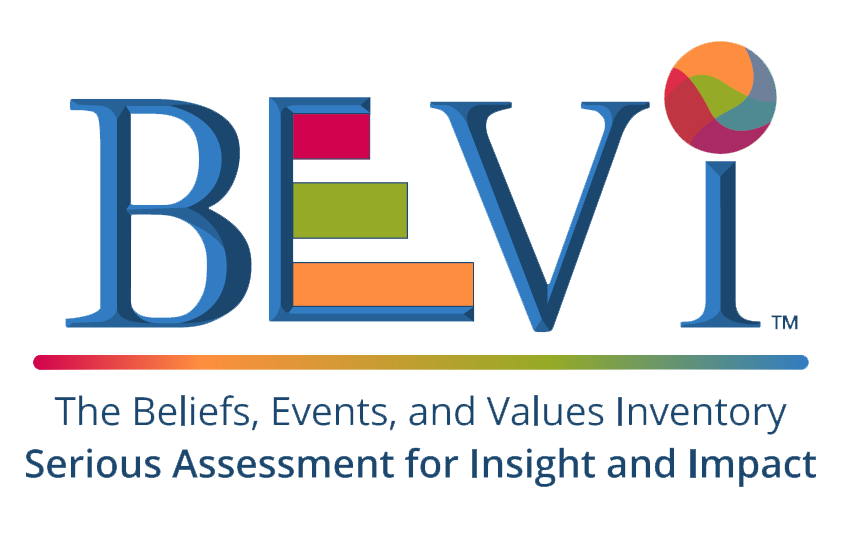Like other validated instruments, the BEVI requires training both to collect, analyze, and interpret data as well as to use the BEVI appropriately across a wide range of applied contexts. Individuals who receive BEVI-approved training are called “BEVI Certified Administrators.” In their work – and for their group, organization, institution, or project – BEVI Certified Administrators can administer the BEVI, provide access to BEVI- AI, manage their data, interpret their reports through the BEVI Administration System, and use the BEVI for an array of real-world purposes.
For several years, high-quality training and certification on the BEVI has been provided by Core Collaborative International, one of our organizational partners (see https://corecollaborative.com/). In other cases, one or more members of the BEVI Team may provide BEVI Training and Certification depending upon your unique needs and circumstances.
Please contact us by clicking here if you are interested in becoming a “BEVI Certified Administrator” or just want to learn more. For information about BEVI Training and Certification rates, please click here.
Training Agenda
To meet the needs of BEVI users, BEVI Training and Certification is provided in person, virtually, or through a hybrid format. Please know that most individuals who become BEVI Certified Administrators do not have a formal background in assessment. Depending upon your background, the entire training process typically requires eight hours (if you are a licensed clinician, or have previous training in test administration, the process may be completed in less than eight hours).
Learning outcomes include:
- Building a solid foundation of theory
- Identifying best practices for group debriefings
- Designing BEVI assessment or research with best practices
- Administering the BEVI self-sufficiently
- Successfully navigating the BEVI administrative site
- Competently analyzing group reports
- Confidently delivering group/individual debriefings
- Knowing where to go/what to do next

Although the BEVI Training and Certification agenda may vary depending on whether it is conducted in person, virtually, or through a hybrid format, the typical training agenda is as follows:
Pre-workshop Preparation (2 hours)
A. Take the BEVI
Use the login information from your trainer to access and complete the BEVI. This step is important, not only so that you can experience the instrument yourself from the participant’s perspective, but also so that your trainer can model a group debriefing during the training seminar with an analysis of the administrator trainee
aggregate results.
B. Complete Background Reading
Download and study this compiled text that synthesizes several published papers in a more easily digestible
format and length, so that you can build a foundation of background knowledge of important concepts and
theoretical frameworks related to the BEVI before beginning your administrator training: BEVI Administrator
Training Prereading
Part I (4 hours)
1. First impressions, getting familiar, understanding goals and applications
This component of the session sets the stage for the training. We want to spend time getting to know you and your goals, needs, system, organization, or institution. This will allow us to tailor the training content to your context. It will also help us establish norms for interaction that will make the session effective and efficient.
2. Model Debrief Session
After appropriate context-setting, which is essential to understanding what the BEVI is and why it is structured as it is, all session participants will have the opportunity to take the BEVI prior to training. The facilitator then will go through the group report and model debriefing best practices. This is an opportunity to view the experience from your stakeholders’ perspectives and begin to interact with BEVI constructs.
3. Build a Solid Foundation of Theory
This component of the training introduces the lens through which the BEVI views learning experiences. We will cover concepts important to understanding the underpinnings of the instrument.
4. BEVI Scales and Demographic Items
We will define each of the BEVI scales, identify all of the demographic item options and the implications for collecting demographic data, and discuss how these constructs align with your organization’s outcomes assessment goals during this segment of the training.
5. Identify best practices for group debriefings
This session will help you understand common responses to the BEVI and give you an opportunity to practice your approach to debriefing BEVI results.
6. Design BEVI administration with best practices
During this section of the training, you will have an opportunity to reflect on how to successfully administer the BEVI for the best data collection results.
Part II (4 hours)
7. Administrative Functions for the BEVI
We will discuss how to deploy the instrument, create groups, generate reports, and interpret reports during this component of training.
8. Administrative Portal Features
You will use your login information to navigate the administrative site, understand the different aspects of the administrative portal and apply functions you need for your specific uses of the BEVI.
9. Analyze group reports
During this component, we will identify all of the aspects of group reports you will need to understand in order to draw meaning and useful information from BEVI reports.
10. Deliver group/individual debrief
We will go over the contexts and best practices for delivering a group debrief. You will also have the opportunity to practice your debriefing skills and receive Feedback.
11. Know where to go next
We will discuss where to go for support and troubleshooting as well as discuss any questions you have regarding the next steps at your organization. Billing and consulting support capacities will also be part of this segment of training.

